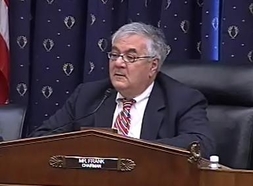AGA Changes Position, Now 'Open to the Concept' of Legalizing Online PokerMajor Commercial Casino Association Changes Online Gaming Position |
|
|

“We now believe that internet gaming can be properly regulated so long as there is a tough regulatory framework that is put in place,” said Fahrenkopf, a former Republican National Committee chairman during the Reagan years who has been with the AGA for all its now 15-year history. “We would be open to looking at legislation that’s out there to see whether or not it provides the consumer protections that we think are so important.”
The AGA, which actually opposed all forms of internet gambling “on the grounds that [they did] not believe the technology exists to properly regulate it with law enforcement oversight” as recently as just over a decade ago, has some of the most powerful casino companies in the world amongst its members — including Harrah’s Entertainment, MGM Mirage, and Las Vegas Sands Corp.
The AGA was formed in 1995 to give the commercial casino industry a voice in Washington, D.C. Only the president, CEO, or chairman of a major company in the gaming industry is eligible to sit on its board of directors, which meets four times a year.
Fahrenkopf said the change in the AGA’s internet gambling policy was made at a board meeting earlier this month, and that it was a result of the association’s new requirements of what is needed in order to create an official lobbying position for the AGA.
Previously, the AGA needed a unanimous consensus from its board of directors to create an official stance for any issue. In December, however, the AGA decided to change that threshold to 75% of quorum. There are currently 11 members on the board of directors.
“It is difficult with all these companies, with their own culture and their own views,” said Fahrenkopf, who acknowledged that while the new language of the AGA’s position may not seem definitive, it represented a notable policy shift from where the AGA has been. “We’ve actually come a long way.”
The AGA’s Past Positions on Online Gaming
The AGA, citing a lack of available technology to properly regulate the industry, initially came out against all forms of online gambling after Senator Jon Kyl (R-AZ) first introduced a bill in 1997 that would’ve outlawed internet gambling.
“That’s really what our state regulators were telling us, that they didn’t think the technology was there and they didn’t think they could properly regulate it,” said Fahrenkopf.
That position changed, however, after MGM decided to open an experimental gambling website on the Isle of Man in September 2002. They only allowed a few countries to gamble with real money, and they banned all others, including the United States.
 “They ran [the site] for about six months, and showed that the technology did exist to prohibit bets coming from districts where it was illegal, that there was sufficient screening that could be done to make sure that the person who was allegedly gambling was in fact the person that was gambling, and that there were ways to look at patterns that may be of some assistance in identifying people who can’t gamble responsibly,” said Fahrenkopf. “Law enforcement officials and regulators tried to see if bets could be placed in jurisdictions where it was illegal, and there were no violations whatsoever. So that kind of showed us that maybe in fact the technology did exist.”
“They ran [the site] for about six months, and showed that the technology did exist to prohibit bets coming from districts where it was illegal, that there was sufficient screening that could be done to make sure that the person who was allegedly gambling was in fact the person that was gambling, and that there were ways to look at patterns that may be of some assistance in identifying people who can’t gamble responsibly,” said Fahrenkopf. “Law enforcement officials and regulators tried to see if bets could be placed in jurisdictions where it was illegal, and there were no violations whatsoever. So that kind of showed us that maybe in fact the technology did exist.”
As a result of MGM’s site, the AGA came out in support of a 2007 bill proposed by Rep. Shelley Berkley (D-NV) and former Rep. Jon Porter (R-NV) that would have studied whether or not the appropriate technology did, in fact, exist to regulate online gaming. However, that bill never made it off the ground in the House of Representatives.
“The markets crashed. And the final six months of the last legislative session, nothing was done except to figure out how we were going to save the banks and the system,” said Fahrenkopf.
So rather than relying on a Congressional study, Fahrenkopf used the muscle and the research ability of the AGA itself to investigate the major issues concerning online gaming. He formed three working groups that AGA members participated on to research three critical issues:
After a couple of months of research, the groups came back with their findings for the December 2008 AGA meeting.
“The first committee reported that in their opinion and through the work that they had done, the technology does now exist. It’s being effectively done on off-shore sites regulated by places like the Isle of Man and Gibraltar, so the systems and the technologies are there to regulate it,” said Fahrenkopf.
The second working group also came to a consensus.
“In regards to cannibalization, the guesstimates were at that time that between $7 billion – $10 billion was being wagered by Americans on the internet despite the existence of UIGEA, and therefore if there was any cannibalization, it was already taking place,” said Fahrenkopf. “And with most of the brick-and-mortar businesses, particularly the big companies, the business dynamics had changed dramatically and less than 50% of the bottom line was coming from gaming anyway, with restaurants and retail, etc. So they didn’t feel like [legalizing it] would be a cannibalization.”

“We had Harrah’s and a number of others who were very strongly supportive of internet gambling and particularly the Barney Frank legislation at that time (which would provide a federal framework), and then you had MGM and another bunch of companies who were in favor of internet gambling, but thought it should be regulated at the state level,” said Fahrenkopf.
With this disagreement, along with gambling entrepreneur Steve Wynn’s “vehement” opposition to online gaming, the AGA couldn’t form an official stance. As a result, the association was neutral on all online gaming issues.
“The net result was that we reached deadlock,” said Fahrenkopf.
The AGA’s New Position on Online Gaming
However, with the new 75% of quorum rule in place for creating policy positions, the AGA decided to officially change their stance in regards to online gaming this month.
“We are open to the concept of legalized internet gambling, so long as there is a regulatory regime that is put in place that protects the consumer and protects the integrity of the game. We’re at this point in time open to the question of whether it’s a federal or state regulatory regime, although I must tell you I think a majority of the board would favor the states. But until we have something that we’re really going to look at, we can’t get to that question,” said Fahrenkopf.

Besides addressing the concerns that some of his members have with the Barney Frank bill, Fahrenkopf also discusses the AGA’s position on UIGEA and why he thinks that law will be necessary, as well as Steve Wynn’s current thoughts on online gaming and what Harry Reid’s reelection bid means for the gaming industry in his interview with Card Player.
Read the entire interview with the AGA president and CEO, Frank Fahrenkopf.
